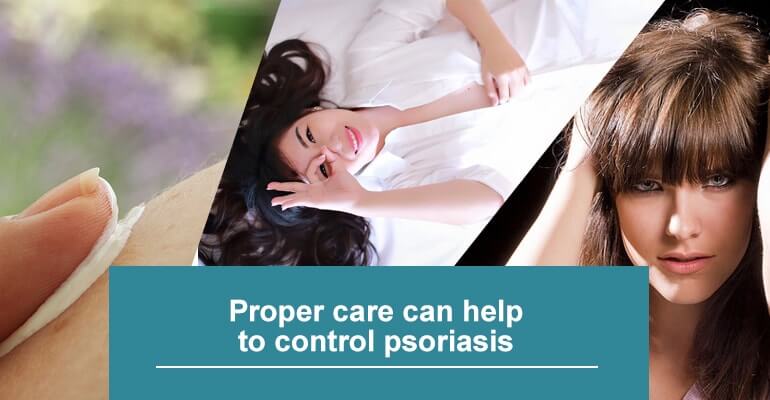How to Maintain a Beautiful Skin If You Have Psoriasis
Skin represents a person’s health state. In the case of skin disease, the appearance and self-esteem might change for the worse, which often leads to negative feelings and psychological issues.
What’s happening
Psoriasis is an incurable disease, but it’s possible to achieve a stable remission. The main complaint is sore skin rashes, itching, and unaesthetic appearance. Clinical pathology is divided into the following forms:
- Light: characterized by a rash in the form of plaques and a lesion of less than 3% of the body area.
- Medium: lesion takes up 3 to 10% of the body area.
- Severe: skin symptoms cover more than 10% of the whole body.
The intensity and clinical manifestations depend on the localization of the process, so these circumstances affect the quality of life of the patients. Rashes located on the legs, arms, hands, and genitals worsen the functional and physical state. The damaged skin on the face or scalp becomes a cosmetic defect.
Psoriasis is not an infectious disease and can’t be transmitted. It affects mainly the adult population ages 18 years and up.
Psoriasis symptoms
Many patients suffer from depression during the relapse, due to rashes, and appearance and attractiveness issues. Those problems are especially difficult to handle for young people and women.
The primary element of rashes is the appearance of a pink papule. It can be a red shade and covered on the top with silver-white scales. The life cycle of this element consists of the following stages:
- Stearin stain.
- Terminal film.
- Bleeding after the scale removal.
Interesting fact
The life cycle of cells in psoriasis is significantly reduced– the cells renew themselves much quicker. People suffering from this disease look much younger due to quicker cell renewal.
Itching has a negative psychological effect. Patients often suffer from insomnia, anxiety, and depression.
How long does it last?
The duration of the rashes in each patient is unique and can last anywhere from several months to several years. Various factors can cause the start:
- stress, tensions;
- aggravation of chronic diseases;
- injuries;
- pregnancy and childbirth;
- medicines, etc.

Beautiful skin despite psoriasis
Timely treatment and preventive measures can significantly speed up the period of remission and improve quality of life. It is necessary to follow certain recommendations:
- Eliminate stress and try to be calm. It may seem difficult, but it is possible. Sports, hobbies, outdoor walks, reading, and going to theater can improve the psycho-emotional state.
- Nutrition is also a key to improving skin condition. It is recommended to eat foods containing vitamins E, A, B, D, minerals, antioxidants, amino acids, Omega-3 fatty acids, etc.
- When taking a shower or bath, make sure that the water temperature is not higher than 96-97 F. Excessively hot water leads to dry skin. Do not use hard washcloths, scrubs, as they injure the affected skin and can lead to complications.
- Although the sun’s rays contribute to a rapid recovery, you need to be careful when exposing yourself to the sun. Try to limit your stay in the heat. Cold can also cause a relapse, so it is necessary to use special creams that protect your skin from the effects of various temperatures.
- Use of cosmetics, which only contain natural ingredients that are beneficial for the skin: vegetable oils (olive, sesame, grape seed, etc.).
- Clothing should only be made from natural fabrics, which should not cause irritation when contacting the skin.
- Quit bad habits (smoking, alcohol). It will provide an improvement of biochemical processes, acceleration of the recovery process, and stable remission.
- Psoriasis is often a concomitant pathology of diabetes mellitus, and diseases of the gastrointestinal tract, etc. Prevention contributes to long-term remission and maintenance of skin in good condition.
- The use of glucocorticosteroids helps to reduce puffiness, inflammation, and itching.
- Antihistamines help to eliminate the influence of the allergen, reducing itching and preventing the development of rashes.
- The use of sedatives can improve the quality of sleep, and reduce anxiety and depression.
- Phytotherapy helps in the elimination of symptoms and improves skin conditions. The choice of herbs should be recommended by a specialist, considering the patient’s health status.
- Physiotherapy helps to speed up the process of remission and improves the quality of life.
- A trip to the spa or resort helps during the recovery period, and prevents the aggravation of the disease.
- Using a UVB lamp will reduce the acute period of the illness and contribute to a longer remission. The condition of the skin will be significantly improved, and inflammatory signs and itching will disappear. This type of therapy is not only an efficient method of treatment, but also a reliable preventive measure to control disease relapses.